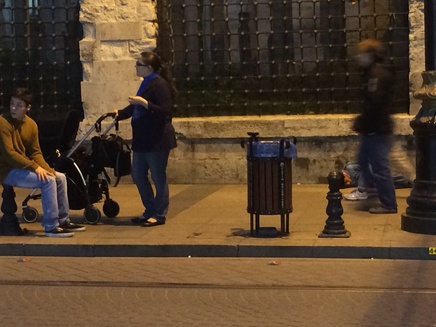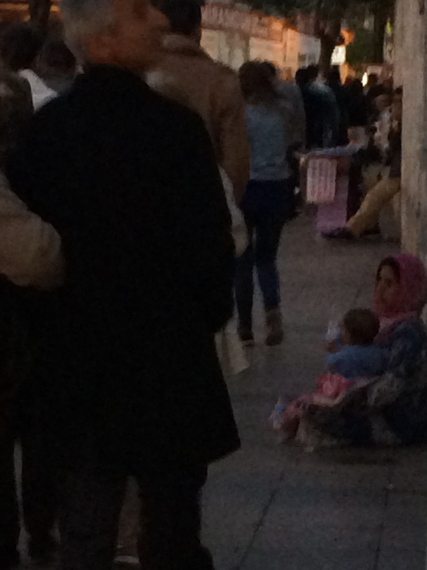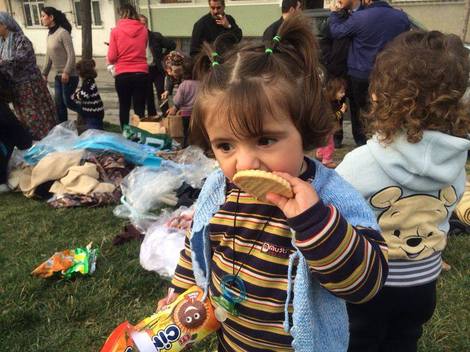Istanbul, Turkey-- It was just after noon in Turkey's largest city and the sounds of the hypotonic tunes of the Muslim call to prayer could be heard across Istanbul. Amid the grandeur of Blue Mosque, a group of young Syrian refugees, ranging in age from 5 to 7 years old, were barraging a Turkish woman who was eating corn on the cob. The children's stories are part of the largest and most intense human suffering of our time. One young girl pleaded for the woman's corn. When that didn't work she tried to steal it while it was still in the woman's mouth. Eventually, the lady who was walking down Beyazit Street, gave up, handing the little girl what was left of the corn. She devoured the remaining bits, obvious that she was starving.
Further down Beyazit street, a five year old girl is rocking her baby brother in her arms, no signs of a mother or father present. The main street in Istanbul's tourist area is lined with Syrian children. Most only speak Kurdish or Arabic. You don't have to speak their native tongue to see the sadness in their eyes. Most of them have white spots on their face, a painful skin condition that arises from living near garbage. Many toddlers had swelled stomachs, most likely caused from acute malnutrition.
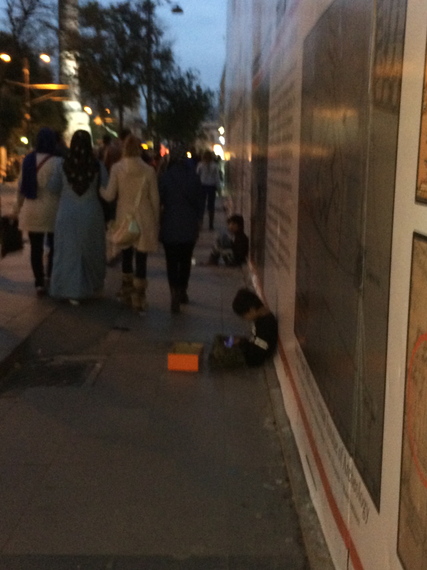 There are an estimated 1.7 million Syrian refugees living in Turkey. The numbers are probably much higher as not every refugee is registered with the Turkish government. Around 350,000 of those are children, but only half receive an education. The remaining 200,000 are part of a lost generation of Syrian children. Part of the reason is language barriers and lack of proper documentation to enroll the kids in Turkish schools. According to the Office of the United Nations High Commissioner for Refugees, the refugees living in camps that are managed by the Disaster and Emergency Management Presidency, are provided free health-care, shelter, food and education. "The influx has particularly put a strain on local infrastructures," says Didem Collinsworth from the International Crisis Group, a non-governmental agency committed to preventing and resolving deadly conflict. Collinsworth adds,
There are an estimated 1.7 million Syrian refugees living in Turkey. The numbers are probably much higher as not every refugee is registered with the Turkish government. Around 350,000 of those are children, but only half receive an education. The remaining 200,000 are part of a lost generation of Syrian children. Part of the reason is language barriers and lack of proper documentation to enroll the kids in Turkish schools. According to the Office of the United Nations High Commissioner for Refugees, the refugees living in camps that are managed by the Disaster and Emergency Management Presidency, are provided free health-care, shelter, food and education. "The influx has particularly put a strain on local infrastructures," says Didem Collinsworth from the International Crisis Group, a non-governmental agency committed to preventing and resolving deadly conflict. Collinsworth adds,
"the camps are costly for the government to build and to maintain, and they fill up very quickly. They are also a short-term solution. Most newcomers in the past year and a half have become what are called "urban Syrians" and live in Turkish cities."
Syrians living outside the camps, who venture into big cities like Istanbul, face a hard time finding essential services. Collinsworth says the international community needs to help Turkey in paying for this "growing burden" and also by "hosting more refugees in Western countries." Turkey has already spent almost $3 billion on the Syrian crisis and the costs are only expected to rise. To give you perspective on just how fast the influx is growing; compare the 1.7 million refugees to date with the numbers in June of 2013. The Turkish Foreign Ministry says the total number of "registered" refugees last year was 387,883. Now compare that number to other countries like Canada, which made a pledge to the UN to resettle 1,300 Syrian refugees by the end of this year. Citizenship and Immigration Canada has revealed that only 325 Syrians arrived in Canada since that commitment was made last year.
According to the 1951 UN Convention on Refugees, Syrian refugees are technically "guests" under "temporary protection." Turkey is only obligated to accept refugees from Europe. Many of the Syrian children who are born in Turkey are not considered Turkish citizens, instead they are issued ID cards. Collinsworth says more needs to be done to ensure their proper rights and status. Fortunately, some grassroots organizations are making a difference. For example, The Platform for Solidarity with Syrians in the Parks finds affordable housing for Syrian families who are living in parks. The group gathers donations online through their Facebook page.
Almost a year ago, Omer Kaya and a few friends founded the organization in Istanbul. Kaya says he saw dozens of homeless Syrian families living in a park near where he lived and he vowed to do something about it. He says "people living in the parks really needed our help." In the past year, Kaya has set up three Syrian families with a place to live and paid their bills. He also helps them find jobs so that they can eventually become financially independent. Kaya says many of them broke down in tears when offered help. For many of these families, accepting help was difficult. They were once doctors, lawyers, and engineers - now they rely on strangers for basic needs like food and shelter.
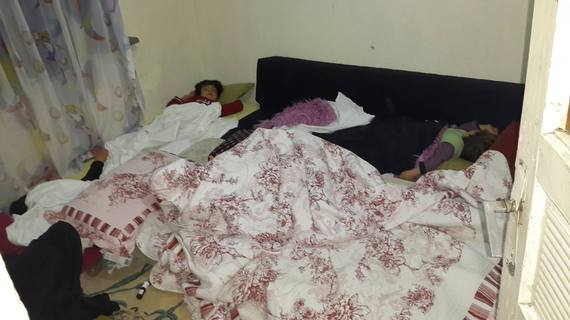 Tensions though are still present. In August of this year, hundreds battled police in Istanbul over the rising number of refugees. As Collinsworth puts it "Turkish people have a dilemma between empathy and frustration towards their southern neighbours." The first wave of Syrian families left their homeland three years ago because of the ongoing civil war and now an unprecedented wave of Syrians are on the run from the terrorist group ISIS. "This summer and early fall, ISIS advances on Kobane have sent over 160,000 Syrian Kurds in to Turkey in the span of just a few days," says Collinsworth. The crisis is an international disaster that requires an international response, while Turkey's resources are stretched to the limit. In early December, the UN's World Food Programme (WFP) was forced to temporarily shut down a critical program that provided food vouchers to millions of Syrian refugees in the Middle East because of a funding crisis. On December 9, the WFP announced it will reinstate the program after a social media campaign raised millions.
Tensions though are still present. In August of this year, hundreds battled police in Istanbul over the rising number of refugees. As Collinsworth puts it "Turkish people have a dilemma between empathy and frustration towards their southern neighbours." The first wave of Syrian families left their homeland three years ago because of the ongoing civil war and now an unprecedented wave of Syrians are on the run from the terrorist group ISIS. "This summer and early fall, ISIS advances on Kobane have sent over 160,000 Syrian Kurds in to Turkey in the span of just a few days," says Collinsworth. The crisis is an international disaster that requires an international response, while Turkey's resources are stretched to the limit. In early December, the UN's World Food Programme (WFP) was forced to temporarily shut down a critical program that provided food vouchers to millions of Syrian refugees in the Middle East because of a funding crisis. On December 9, the WFP announced it will reinstate the program after a social media campaign raised millions.
Harsh winter weather is fast approaching in the Middle East. If the member states of the United Nations don't do something soon, the world's failure to deal with the catastrophe that is spilling out of Syria's civil war, could soon reach historic proportions.
